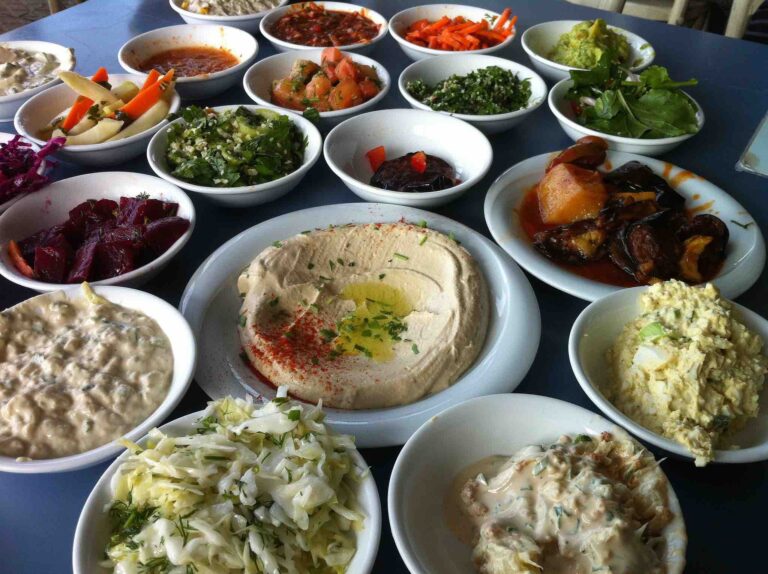Introduction: Understanding Israeli Cuisine
Israeli cuisine is a vibrant and diverse culinary landscape that has been shaped by various factors over the years. The country’s location at the crossroads of Europe, Asia, and Africa has led to a unique blend of culinary influences. Furthermore, the Jewish population, which is the majority in Israel, has played a significant role in shaping the country’s food culture. In this article, we will explore the relationship between Jewish culinary traditions and Israeli cuisine.
Jewish Culinary Traditions: An Overview
Jewish culinary traditions are rooted in the kosher laws, which dictate what foods are allowed and forbidden. Kosher laws prohibit the consumption of certain animals, such as pigs and shellfish, and require the separation of meat and dairy products. Jewish cuisine is rich in flavor, with dishes often featuring bold spices and herbs. Some of the most well-known Jewish dishes include matzo ball soup, gefilte fish, and brisket.
Influence of Jewish Cuisine on Israeli Food
Israeli cuisine is heavily influenced by Jewish culinary traditions. Many of the dishes that are now considered staples of Israeli cuisine have Jewish roots. For example, falafel, which is a popular street food in Israel, originated in Egypt but was introduced to Israel by Yemenite Jews. Shakshuka, which is a breakfast dish of eggs poached in a tomato sauce, is believed to have been brought to Israel by North African Jews. Other dishes that have Jewish roots include hummus, shawarma, and sabich.
Jewish Ritual Foods and Their Significance
Jewish cuisine is not just about everyday dishes but also includes foods that are significant in religious rituals. For example, challah bread is a type of braided bread that is eaten on the Jewish Sabbath and holidays. Matzo is a flatbread that is eaten during the Passover holiday when leavened bread is forbidden. Apples dipped in honey are eaten on Rosh Hashanah, the Jewish New Year, to symbolize a sweet year ahead.
A Look at Israeli Dishes with Jewish Roots
Israeli cuisine is a fusion of various culinary traditions, and many dishes have multiple influences. However, some dishes have a clear Jewish heritage. For example, kugel is a baked noodle pudding that is typically made with egg noodles, cottage cheese, and raisins. It is a classic Jewish dish that is often served at holiday meals. Latkes, which are potato pancakes, are another Jewish dish that is popular in Israel. They are traditionally eaten during Hanukkah, the Jewish Festival of Lights.
Conclusion: The Intersection of Jewish and Israeli Cuisine
Jewish culinary traditions have played a significant role in shaping Israeli cuisine. Many of the dishes that are now considered staples of Israeli food have Jewish roots, and Jewish ritual foods are an important part of the country’s food culture. However, Israeli cuisine is not just about Jewish food but also incorporates influences from other cultures. The intersection of Jewish and Israeli cuisine has created a unique culinary landscape that is diverse, flavorful, and constantly evolving.

